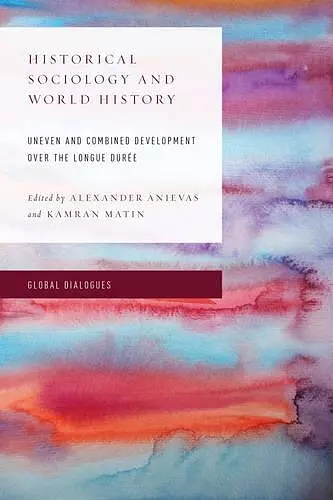Historical Sociology and World History
Uneven and Combined Development over the Longue Durée
Alexander Anievas editor Kamran Matin editor
Format:Paperback
Publisher:Rowman & Littlefield International
Published:12th Sep '16
Should be back in stock very soon
This paperback is available in another edition too:
- Hardback£131.00(9781783486816)

The concept of 'uneven and combined development' was originally coined by Leon Trotsky to theorise Tsarist Russia's distinctive experience of modernity and revolution. But it has re-emerged over the last decade or so as a burgeoning research programme within International Relations (IR) and historical sociology. It has been critically and creatively deployed in two main areas: the provision of a sociological foundation to international theory overcoming the chronic schism between ‘sociological’ and ‘geopolitical’ modes of enquiry; and, relatedly, in superseding prevailing Eurocentric approaches in the social sciences. This volume is the first to provide a sustained reflection on the idea of uneven and combined development as the intellectual basis for a non-Eurocentric social theory of ‘the international’. It does so through a series of empirically rich and theoretically informed analyses of socio-historical change, political transformation, and intersocietal conflict over the longue durée. The volume thereby aims to demonstrate the unique potentials of uneven and combined development in overcoming IR and historical sociology’s shared inability to theorize the interactive and multilinear character of development.
In recent years, a growing number of international relations scholars have used the idea of uneven and combined development to fashion social theories of “the international.” First proposed by the Russian Marxist revolutionary Leon Trotsky to describe the trajectory of the Russian Revolution, uneven and combined development as a theoretical framework has been employed to avoid Eurocentrism and highlight cross-society interactions. Anievas (Univ. of Connecticut) and Matin (Sussex Univ., UK) have assembled an impressive array of experts to extend such an idea to historical sociology. Aside from the charge of marginalizing non-European societies, mainstream historical sociology has mostly focused on single nation-states. Uneven and combined development, on the contrary, provides a pluralist perspective on the development of global capitalism over the long term. This edited volume is rich in empirical case studies, ranging from the Ottoman Empire to the Opium War, with no shortage of insights on the different paths of capital accumulation and market integration. While uneven and combined development may not achieve the status of a theoretical paradigm, this insightful book certainly fulfills its goals in bringing extra-European societies into the discussion of world history and in bridging the fields of historical sociology and world history. Summing Up: Highly recommended. Faculty. * CHOICE *
Alexander Anievas and Kamran Matin’s edited volume is a formidable compendium of cutting edge scholarship by leading historical sociologists and world historians, radically rethinking their respective fields far beyond their inherited and still dominant Eurocentric gaze. What they achieve is not just a massive contribution to their disciplinary fields, but far more importantly the recasting of world history in a manner that for the first time invests “the world” with seriously grounded significance. With this volume their central and guiding idea of “uneven and combined development” becomes definitive to any serious generation of scholarship to follow. -- Hamid Dabashi, Professor of Iranian Studies and Comparative Literature, Columbia University
Debates on uneven and combined development within historical sociology have portrayed, for far too long, the “periphery” of non-Europe as a passive recipient of diffusions from a European “core”. This book is a standout success in “deprovincialising” historical sociology to finally address the problems of tunnel vision, diffusionism, and the straightjacket of Eurocentrism. -- Adam David Morton, Professor of Political Economy, University of Sydney
Anievas and Matin have assembled a creative and compelling discussion for an alterrnative to Eurocentric world history and historical sociology. Ranging from the Paleolithic to late capitalism, and incorporating a rich geographical diversity, the conrtibutors offer an important relational and global contribution to the much-needed rebirth of historical sociology. -- Jason W. Moore, Assistant Professor, Fernand Braudel Center, Binghamton University, author of Capitalism in the Web of Life
This exciting book seeks to renew, refresh and critically defend historical sociology in light of a host of challenges to the premises that underlie the classical traditions of social and political thought. The chapters form a wide-ranging conversation that will be edifying to all historians and theorists of international relations. -- Robbie Shilliam, Queen Mary University of London, Reader in International Relations
ISBN: 9781783486823
Dimensions: 227mm x 152mm x 22mm
Weight: 458g
318 pages